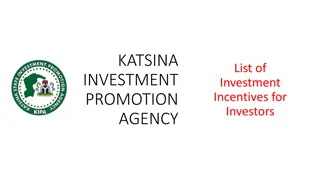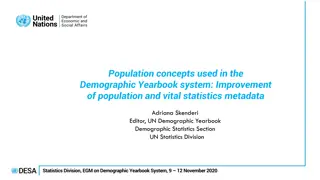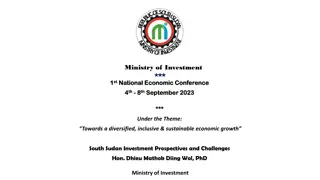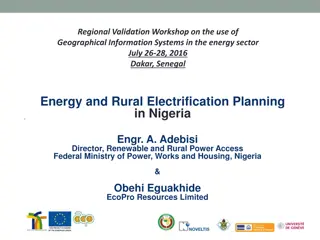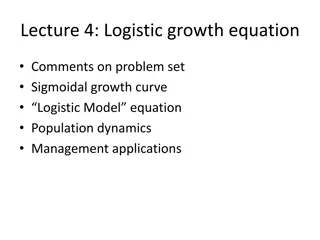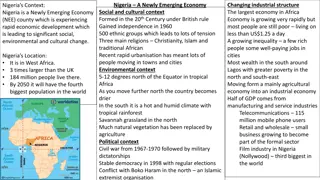Investment Opportunities in Nigeria: Economic Potential & Population Trends
Nigeria presents lucrative investment opportunities in sectors such as oil and gas, agriculture, renewable energy, tourism, and commodity trade. With a population exceeding 213 million and a strategic location in West Africa, Nigeria offers a substantial consumer market and is projected to become the world's third most populous nation by 2050. The country's abundance of natural resources and the government's focus on fostering economic ties make it an attractive destination for serious investors.
Uploaded on Feb 26, 2025 | 0 Views
Download Presentation

Please find below an Image/Link to download the presentation.
The content on the website is provided AS IS for your information and personal use only. It may not be sold, licensed, or shared on other websites without obtaining consent from the author.If you encounter any issues during the download, it is possible that the publisher has removed the file from their server.
You are allowed to download the files provided on this website for personal or commercial use, subject to the condition that they are used lawfully. All files are the property of their respective owners.
The content on the website is provided AS IS for your information and personal use only. It may not be sold, licensed, or shared on other websites without obtaining consent from the author.
E N D
Presentation Transcript
"Investment Opportunities in Nigeria Presented by: Felix Logo, Head Consular & Education Embassy of Nigeria, Athens Wednesday, November 29th, 2023 Chamber of Pieria 1
Global Economic Trends and Nigeria's Potential: Shift from oil-driven economies to new trends: agriculture renewable energy tourism commodity trade Nigeria, the most populous black nation with over 200 million people. Largest economy in Africa. Significant opportunities for serious investors due to rich natural resources. Timely focus on economic developments and business conditions in Sub- Saharan Africa. Growing interest in fostering economic ties between nations. 2
Population I Population 2014 2015 2016 2017 2018 2019 2020 Urban 84.275.849 88.019.904 91.848.722 95.817.238 99.876.265 104.004.479 108.242.753 Rural 95.103.167 95.975.881 96.818.209 97.678.669 98.511.358 99.300.013 100.084.652 Total: 179.379.016 183.995.785 188.666.931 193.495.907 198.387.623 203.304.492 208.327.405 Nigerian Urban/Rural Population 2014-2020 120,000,000 Increasing population, both in urban and rural 100,000,000 areas. 80,000,000 The population growth in urban areas is more 60,000,000 pronounced than in rural areas. 40,000,000 People continue to migrate from rural to urban 20,000,000 areas. - 2014 2015 2016 2017 2018 2019 2020 Possible reasons: job opportunities and a better Series1 Series2 quality of life. 3
Population II AGE (2022) % MALE FEMALE Population differentiation in Nigeria by age and gender 0-14 years: 41,70% 45571738 43674769 in 2022. 15-24 years: 20,27% 22022660 21358753 Percentage and number of men/women per age group 25-54 years: 30,60% 32808913 32686474 in the table. 55-64 years: 4,13% 4327847 4514264 Age groups 0-14 and 15-24 have the highest 65 years and 3,30% 3329083 3733801 percentage of the population over: TOTAL 100,00% 108060241 105968061 The number of men is slightly higher than that of women up to the age of 24. The male-to-female ratio is balanced in the age groups 25-54 years. The number of women surpasses that of men in the age groups 55+. 4
Overview of Nigeria's Economic Potential With a population exceeding 213 million, Nigeria offers a substantial consumer market and the largest economy in Africa. Abundant natural resources, including commercial quantities of petroleum, natural gas, and over 41 mineral resources, present lucrative opportunities for investors and traders. The strategic West African coastal location positions Nigeria as a potential maritime hub for West and Central Africa. Projected to reach 402 million by 2050, Nigeria is on track to become the world's third most populous nation. The scale of opportunities, a quality workforce, and a shared vision between the government and private sector contribute to Nigeria's appeal as an investment destination. 5
Investment Opportunities: 1.Oil and Gas Sector 1. Top 4 largest oil producers in Africa. 2. Oil and gas sector accounts for over 90% of exports. 3. Nigerian National Petroleum Corporation Limited (NNPCL) is the principal regulator and exporter. 4. Joint ventures with major companies like Chevron, Exxon Mobile, and Shell. 5. Partnerships with the European Union to address gas shortfalls. 6. Nigerian Liquefied Natural Gas (NLNG) project offers significant investment potential. 7. Present Nigerian Government Initiative ensures financial security for investors. 6
2. Agriculture Agricultural Investment Opportunities Land Area and Climate: Nigeria boasts a vast land area of 923,769 square kilometers. Favorable climate, making it an ideal destination for agriculture. Crop Diversity: Major producer of crops such as cassava, yam, maize, sorghum, etc. Agribusiness Potential: Lucrative opportunities in agribusiness. Options include crop cultivation, livestock farming, fisheries, and food processing. Workforce Advantage: Huge population and a vibrant youth demographic. Added advantage for the workforce needed in investment, production, and distribution within the agricultural value chain. 7
Key Sectors of Nigeria Northwestern Region Sector: agriculture, agro- processing, mineral extraction, textile industry, clothing and footwear, educational services Northeastern Region Sector: agriculture, livestock farming, small hydropower energy North Central Region Sector: agriculture, livestock farming, mineral extraction, small hydroelectric power, thermal power station, iron and steel, ceramics, tourism Southeastern Region Sector: mineral mining, agriculture, automotive, clothing and footwear, food and beverages, tourism Southwest Region Sector: financial services, food and beverages, clothing and footwear, ceramics, educational services, information technology, tourism, thermal power station, maritime, inland waterways Southern Region Sector: oil and natural gas, petrochemicals, tourism, fisheries, thermal power station, maritime, inland waterways Animalhusbandry Petrochemicals Crop production Powergeneration Coastal fishing Services Industrialproduction 8
3. Telecommunications Opportunities Nigeria's Telecom Boom: The telecommunications sector is experiencing rapid growth in Nigeria, fueled by a large and progressively mobile population. Demand Surge: With a surge in demand for mobile services, there's a significant market waiting to be tapped into. Strategic Partnership: Greece, known for its expertise in technology and innovation, can forge strategic partnerships to capitalize on these opportunities. Youthful Tech Enthusiasts: The burgeoning population, especially the tech-savvy youth, creates a conducive environment for profitable technological innovations. Urban and Rural Connectivity: The expanding demand for telecommunications services spans both urban and rural areas, presenting diverse investment prospects. Profit-Oriented Ventures: Investors can explore profit-oriented ventures that align with Nigeria's growing need for advanced telecommunications solutions. 9
4. Technology & Digital Services in Nigeria Software Development: Nigeria is a burgeoning hub for software development, offering opportunities for investment in innovative digital solutions. Digital Marketing: The country has seen a rise in digital marketing, providing a fertile ground for investors looking to engage with the online consumer base. Mobile Telecommunications: The mobile telecommunications sector is thriving, reflecting the increasing demand for mobile services in Nigeria. Digital Economy Growth: Nigeria recognizes the transformative power of the digital economy. Globally, economies are shifting towards digitalization, and Nigeria is at the forefront of this trend. Focus on Artificial Intelligence (AI): Acknowledging the importance of AI, Nigeria is actively embracing it as a means to enhance the design, production, and distribution of goods and services. Government Initiatives: The Nigerian government, attuned to these trends, has appointed a dynamic digital entrepreneur Communication, Innovation, and Digital Economy. This underscores the commitment to foster an environment conducive to digital investment. as the Honourable Minister for 10
5. Commodity Products Manufacturing in Nigeria Significant Manufacturing Sector: Nigeria boasts a robust manufacturing sector, playing a pivotal role in the country's GDP. Diverse Product Range: The manufacturing industry in Nigeria spans various products, including food and beverages, textiles, chemicals, and pharmaceuticals. Export Opportunities: Nigeria exports a wide array of commodities globally. Key exports include cocoa, sesame seeds, cashew nuts (shelled and unshelled), coconuts, ginger, frozen shrimps, and prawns. Untapped Potential: A golden opportunity for foreign investors in a burgeoning market. Greek Companies' Success Stories: Highlighting success stories of Greek companies like AG Leventis, Mandilas, and Flour Mills, led by prominent figure Mr. George Coumantaros. These companies have not only established a strong presence but continue to reinvest, showcasing the favorable business environment, supportive government policies, and the expansive market Nigeria offers. Strategic Geographical Location: Nigeria's strategic location in Sub-Saharan Africa enhances its attractiveness as a manufacturing destination, providing easy access to regional markets. 11
6. Renewable Energy Opportunities Government Initiatives: Present administration's commitment to addressing energy needs by implementing legislation empowering the private and public sector in power generation, storage, and distribution. Diverse Renewable Sources: Opportunities abound in renewables such as solar, wind, hydro, etc. Incentives for Investors: The government provides various incentives to attract investors, fostering a conducive environment for renewable energy projects. Reducing Dependency on Fossil Fuels: Nigeria is actively reducing its reliance on fossil fuels, emphasizing the importance of renewable energy capacity for sustainable development. Job Creation: The power sector initiatives contribute significantly to job creation, addressing unemployment issues. The scale of projects generates numerous employment opportunities. Success Story - METKA: Highlighting the involvement of METKA, a subsidiary of Greek company Mytilineos, in Nigeria's power sector. METKA's role includes providing comprehensive EPC services for universities, covering power generation plants, street lighting, training centers, and maintenance. Open for Investment: Renewable energy sector in Nigeria is open for investment, offering promising returns. 12
7. Real Estate Investment in Nigeria Population Impact: Nigeria's population surpasses 200 million, creating a substantial housing deficit that demands attention. Rapid Market Growth: The real estate market in Nigeria is experiencing rapid growth, driven by strong demand for residential and commercial properties. Investment Opportunities: Real estate projects, both residential and commercial, present lucrative investment opportunities, addressing the housing deficit and supporting infrastructure development. Unlocking Potential: Emphasizing the need to unlock the potential of the real estate sector, highlighting the scale of opportunities available. Collaboration for Success: Filling the housing gap requires collaboration between the government and private partnerships, creating a conducive environment for investors. House Mortgage Financing: Real estate investment opens avenues for house mortgage financing, with financial institutions playing a crucial role in funding housing projects and providing mortgage loans to the population. Nationwide Housing Deficit: Every state in Nigeria faces a housing deficit, emphasizing the nationwide scope of the opportunity for investors. 13
8. Mining and Solid Minerals Investment Solid Minerals Investment Abundant Resources: Nigeria boasts rich reserves of solid minerals such as gold, coal, limestone, bitumen, and lithium. Viable Business Opportunities: Investment in mining activities, from exploration to extraction, offers lucrative business opportunities. Key Sector for Investors: The solid mineral sector is a key area for potential investors seeking diversification and long-term returns. Government Initiatives: The government has taken measures to reduce financial burdens for mining investors, particularly in the importation of machinery and equipment. 9. Healthcare & Pharmaceutical Opportunities Lucrative Sector: Nigeria's substantial population creates a lucrative market for healthcare and pharmaceutical investments. Research and Production: Opportunities abound in research and production of pharmaceutical drugs and medical products. Viable Investment: The healthcare and pharmaceutical industry is a viable and strategic investment for long-term growth. 14
10. Marine & Blue Economy Opportunities New Economic Frontier: Nigeria's commitment to the Blue Economy is evident with the creation of a dedicated ministry, signaling a new phase in economic development. Potential for Growth: Proper investment in the Blue Economy can double benefits compared to traditional sectors like oil and gas, fostering prosperity and national growth. Diverse Opportunities: Marine Transportation Aquaculture Boat and Shipbuilding Ports Development Environmental and Waste Management 15
Key Sectors Maritime Transportation: The maritime sector is vital to Nigeria's economy, supporting imports of raw materials and machinery for manufacturing, as well as exporting commodities. Greece, with its maritime expertise, could collaborate with Nigeria to enhance its maritime infrastructure and meet the growing demand for efficient transportation. Aquaculture: Collaborative prospects between Nigeria and Greece in aquaculture include fish farming, processing, utilizing biomass for fish feed, packaging, storage, and leveraging biotechnology to unlock the potential of diverse marine organisms. Maritime Education and Training: Crucial for the blue economy. Leveraging Greece's expertise in this field, there's an opportunity to enhance Nigerian institutions and curriculum. Joint initiatives can be implemented for capacity building and vocational training within the maritime sector. Shipbuilding, ship repairs, and warehousing stand out as crucial sectors in the blue economy. With its esteemed reputation in shipbuilding and ship repair industries, Greece brings forth its rich maritime heritage and a proficient workforce, presenting an excellent opportunity to share knowledge and expertise with Nigeria. 16 16
Diverse Opportunities Diverse Opportunities 1. Tourism 2. Entertainment (Nollywood) 3. Music 4. Sport Investment Channels Investing in a Nigerian Company: Purchase shares in any Nigerian company. Government Bonds Investing in Nigerian Government Bonds: Acquire bonds through a Nigerian bank or broker. 17
NIPC main functions The NIPC was established in 1995 to encourage, promote, and coordinate investments in Nigeria. Promotes Nigeria as an attractive investment destination Provides information on investment opportunities and sources of capital Investment Image Promoting investment in Nigeria, by Nigerians and non-Nigerians Coordinates all investment promotion activities in Nigeria Investment Promotion Providing support services to investors and registering businesses in Nigeria Provide information about investment incentives; and Incentive applications Investment Facilitation Taking and supporting measures that enhance the investment climate Assess the impact of investments and incentives in Nigeria and make appropriate recommendations Advises the Government on policy issues to promote Nigeria's economic development Advocacy Policy Source: Nigerian Investment Promotion Commission Act, Chapter N117, Laws of the Federation of Nigeria 2004 18
Conclusions Foreign investment can improve Nigeria in the following areas: Infrastructure: Investors can invest in infrastructure, such as roads, bridges and warehouses, that will help improve the transportation and storage of agricultural and energy products. New technologies: improvements in productivity and performance in sectors such as services, construction Renewable energy sources: Through the construction of facilities and the application of technologies that utilize these energy sources. Job creation & unemployment reduction Transfer of know-how Development of exports 19
Thank You For More Inquiries, Contact: Nigerian Embassy Athens Address: 17 Streit Street, Filothei 152 37 Phone: +30 210 80 21 168 Email: nigeria.athens@foreignaffairs.gov.ng 20





